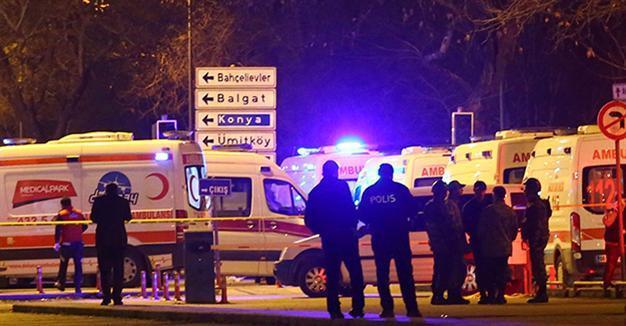Turkish inspectors to dive deeper into detail of Ankara bombing
Fevzi Kızılkoyun - ANKARA

Turkish police and ambulance cars are seen near the site of an explosion after an attack targeted a convoy of military service vehicles in Ankara on February 17, 2016. AFP Photo
Turkey has instructed criminal investigation experts to conduct a detailed study of a deadly bomb attack that killed dozens in Ankara last week as authorities discuss high-level security measures across the country.
Tasked with determining whether any negligence by security or intelligence officials might have led to the attack, chief civil and police inspectors will study why the Feb. 17 attack, which killed 29 and injured scores more, could not be prevented.
The inspectors are expected to prepare a report following the study and present it to the Interior Ministry and the Turkish Police Department. In the event that negligence is determined, responsible civil servants could be subjected to suspension.
The study will cover a number of issues that includes how the perpetrator of the Ankara bombing, Abdulbaki Sömer, entered Turkey despite allegedly staying in the training camps of the outlawed Kurdistan Workers’ Party (PKK) in northern Iraq.
Daily Hürriyet reported on Feb. 25 that Musa Sömer, the father of Sömer, searched for his son in PKK camps for years after he reported his son missing in 2005. Speaking during his interrogation as a suspect in the counterterrorism unit of the police department in the eastern province of Van, Sömer said he went to PKK camps in northern Iraq, namely, Haftanin in 2008, Zap in 2011, Gare in 2013 and Metina in 2014.
Among those that are to be thoroughly investigated during the study are how the perpetrator registered himself with a migration directorate branch as a Syrian with the fake name “Salih Muhammed Neccar” and why cross-border activities by Sömer were not investigated even though he crossed into the southeastern province of Mardin from Syria and back into the war-torn country twice with the fake identity “Neccar.”
The study will also investigate why security and intelligence officials failed to keep track of the car used in the Ankara bombing as the car went through nearly no security checks even though it was stolen in the Aegean province of İzmir and brought to Istanbul.
The probe will also investigate why the car could not be located despite being reported stolen to the police by its owner. The inspectors will also attempt to determine why the stolen car was sold to a person nicknamed “Arap Yakut” who previously provided cars used in bombing attacks in Istanbul and the southeastern province of Diyarbakır.
The move came amid discussions on high-level security measures for the capital and elsewhere after the capital witnessed its second deadly bombing in just four months.
Parliament will also move to beef up security following a meeting on Feb. 24. The legislature’s compound will be surrounded by high-security metal fences which were previously used for the area surrounding the country’s presidential complex, while unmanned aerial vehicles (UAVs) with firing systems are to be placed at specific spots around the compound.
Among the security measures discussed in the meeting were placing X-ray machines for cars at the gates of the parliament compound and even searches of Turkish lawmakers’ official cars, a security measure stated in a report by Turkish security officials that led to a small debate among parliamentarians.
At least 29 people were killed and 81 others were injured in the second attack to target the country’s capital after alleged Islamic State of Iraq and the Levant (ISIL) militants bombed a peace rally in a major city thoroughfare and left at least 100 others dead on Oct. 10, 2015.
